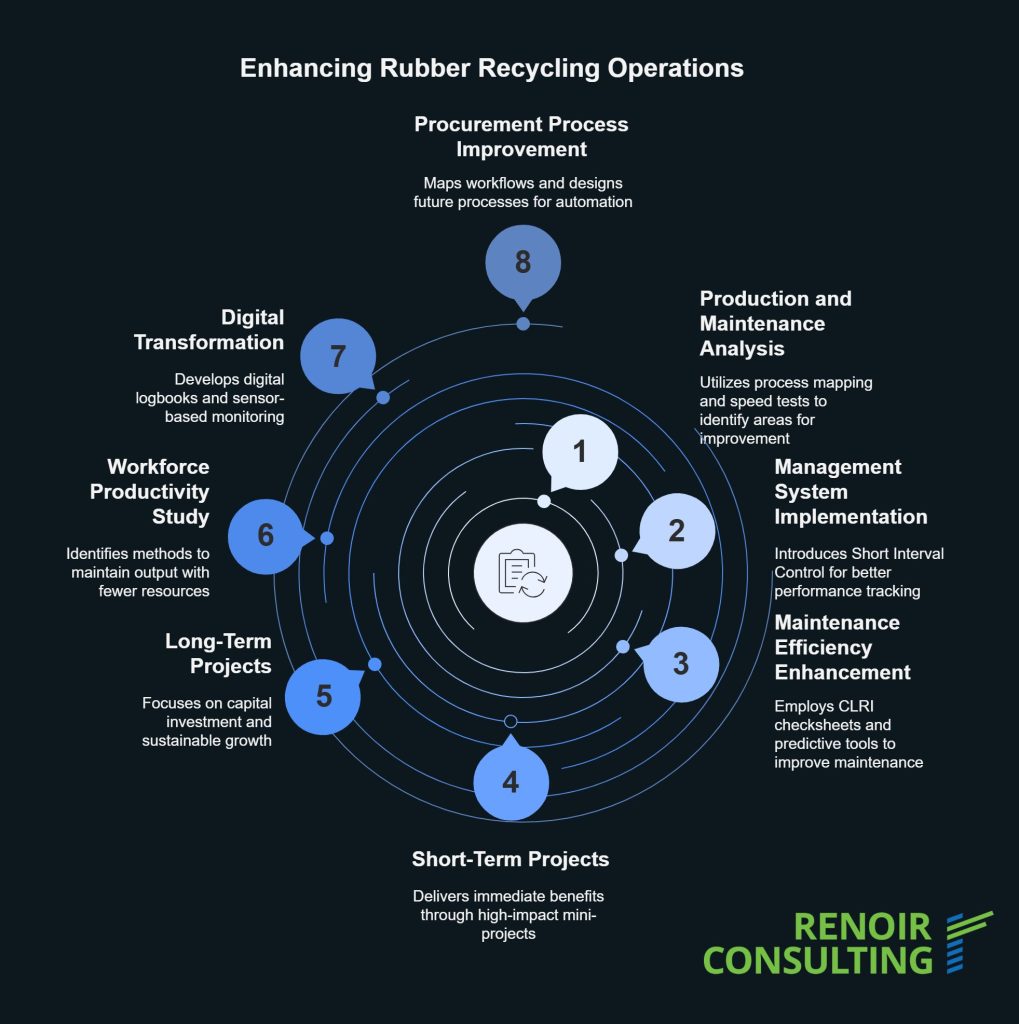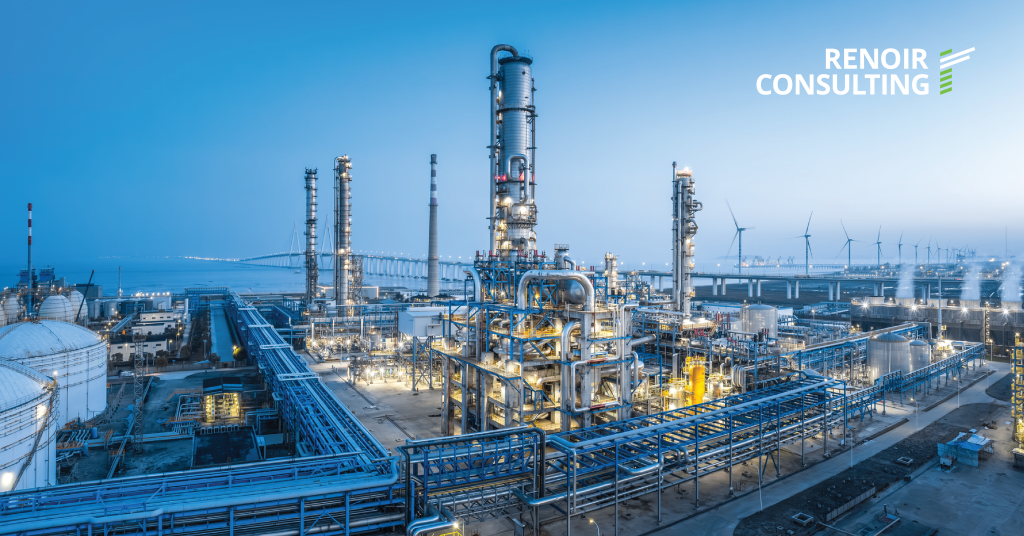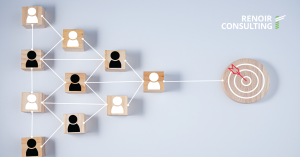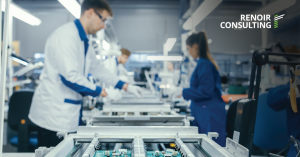At a Glance
- Asian manufacturer giant in the rubber recycling industry, faced challenges in and aimed to streamline production processes and improve workforce productivity while integrating digital tools.
- Partnership with Renoir boosted average daily production improved from 76.5 MT/day to 82.9 MT/day.
- This case study explores the systematic transformation led by Renoir Consulting to drive long-term operational excellence and digital evolution.
Key results
- 8.3% increase in average daily production.
- 11.3% blue-collar manpower optimisation opportunity identified.
- Digitisation of operational logbooks for real-time process visibility.
- Proof of Concept (PoC) successfully executed for Digital Transformation.
- Improved maintenance through new control systems and job planners
Background
With the global rubber recycling market projected to grow from USD 3.72 billion in 2024 to USD 6.18 billion by 2033, manufacturers face increasing pressure to innovate or risk producing lower-quality recycled rubber that is less attractive to customers and downstream industries, losing market ground to more advanced competitors.
The client, a major player in the rubber recycling industry in Asia, operates multiple large-scale facilities and is recognised for its sustainable, high-performance polymer materials. Over several decades, it has developed advanced processes to convert end-of-life rubber into high-quality reclaim rubber and polymer composites used globally. With a focus on operational efficiency and sustainable growth, the client recognised the need for expert support to unlock new performance gains and prepare its operations for a digital future.
Analysis
Despite ongoing initiatives in operations and maintenance, the client faced systemic inefficiencies across production and workforce utilisation. Fragmented management control systems limited visibility into shopfloor performance, and decision-making lacked real-time data support. Furthermore, digital tools were underutilised, and the procurement process needed automation. The executive leadership realised that to maintain a competitive advantage, a comprehensive performance enhancement strategy was crucial. Renoir Consulting was engaged to conduct a detailed analysis focusing on operational excellence, digitalisation, and manpower productivity.
Project Approach
Renoir’s transformation strategy revolved around four key workstreams:
Operational Excellence – enhancing management control systems in production and maintenance, leading to increased output while enabling effective visual shopfloor management for better efficiency.
Digital Transformation – digitising operations logbooks, design a scalable digital system across the plant, identifying and selecting the right digital transformation partner, and enabling a proof of concept (PoC).
Manpower Productivity – Indepth studies across departments to identify opportunities and recommend practical enablers for implementation
Procurement Process Automation – assessing the current state, designing a fit-for-use future process, and developing a business requirement document to guide GRP in implementing automation with its chosen technology partner.
Renoir collaborated with cross-functional teams, forming a project structure that included:
- A dedicated taskforce drawn from junior management and Renoir consultants.
- A Management Action Team (MAT) led by the Plant Head and supervisors for weekly progress reviews.
- A Steering Committee from senior management for strategic oversight.
These workstreams were consolidated into two major packages to streamline execution:
Package 1: Operational Excellence & Manpower Productivity
Package 2: Digital Transformation & Procurement Automation
“With Renoir’s structured approach, we achieved significant production improvements, streamlined workforce utilisation, and digitised key processes. The implementation of digital logbooks and PoC has empowered our team with data-driven decision-making.”
– COO
Ready for a change in your organisation?
Implementation

Renoir delivered hands-on support to implement lasting improvements. The focus was on driving operational excellence in the rubber recycling industry through practical and scalable actions.
- The team analysed key areas in production and maintenance using process mapping, speed tests, and delay studies.
- A tailored Management System with Short Interval Control was introduced to improve daily performance tracking.
- Several short-term, high-impact mini-projects delivered immediate benefits.
- Long-term projects were designed for capital investment and sustainable growth.
- A workforce productivity study identified how to maintain output with fewer resources using low-cost automation.
Maintenance efficiency was enhanced using:
- CLRI checksheets
- Job planners and technician job cards
- Improved preventive maintenance schedules
- Predictive tools like vibration analysis and laser alignment
To support digital transformation:
- Renoir developed digital logbooks using AppSheet for real-time data capture.
- Sensor-based monitoring areas were identified.
- Equipment cycle time logic was co-developed with plant teams.
- RFPs were prepared to select the right digital transformation partner.
- A Proof of Concept (PoC) was successfully completed.
In procurement:
- Renoir mapped current workflows across raw materials, engineering, and services.
- A future-state process design was created to support automation and efficiency improvements.
- These initiatives collectively enabled the client to embed sustainable change and improve visibility, control, and decision-making across operations.
Results
The collaboration led to significant, measurable, and structural improvements:
- Production efficiency surged by 8.3%, increasing daily output from 76.5 MT to 82.9 MT.
- Workforce optimisation of 11.3% in blue-collar roles was identified, ensuring sustained production with fewer resources.
- The introduction of digitised operational logbooks allowed accurate and timely data capture, enhancing decision-making.
- The Digital Transformation PoC not only succeeded but also created a replicable model for all client plants.
- Upgraded maintenance routines and planning mechanisms ensured reduced downtime and better resource utilisation.
These results are not just improvements—they’re steps toward a culture of continuous improvement and sustainable transformation.
*We have intentionally omitted client-specific details to maintain strict confidentiality.
Unsure how to optimise your processes and empower your teams?












